- Home
- Deborah Garner
Gingerbread at Moonglow Page 4
Gingerbread at Moonglow Read online
Page 4
Betty nodded and turned to Clive. “She’s right. You found us a beauty this year.”
“Why thank you, ladies,” Clive said. “Don’t mind if I say so myself: I agree.”
Maisie poked her head into the kitchen as Betty and Clive left to bundle up for a chilly evening walk. “I’m going to clear plates, Mist. That way you can get started on preparations for the activities, if you want.”
“Thank you, Maisie,” Mist said. “I will feel better if I get started tonight, rather than tomorrow morning.”
As Maisie headed back out to the café, Mist pulled dishes down from cupboards above the refrigerator, where she had stashed a marvelous find earlier that year from Secondhand Sally’s: twelve large bowls of similar, yet varied, pottery designs. The glazes covered just about every color in the rainbow. From the first time she’d laid eyes on them, Mist knew exactly what she’d use them for. Now, she set them around the center island, leaving one large, empty space in the middle.
“I have an idea,” Mist said as Maisie brought an armful of dinner plates in from the café. “Is the professor’s daughter still out there? And maybe the Weber girls?”
“They certainly are, all three of them,” Maisie laughed. “Giggling up a storm at that table of theirs. I’d say they’ve hit it off.”
Mist smiled. “Perfect. Ask them if they’d like to help with a task in the kitchen.”
“Are you up to what I think you are?” Maisie asked. “Should I tell them?”
“No, I wouldn’t.” Mist shook her head. “Let them be surprised. If they volunteer to help, they’ll deserve a treat.”
“Or several,” Maisie qualified.
“Yes,” Mist laughed. “Exactly.”
A few minutes later, all three girls showed up in the kitchen. Whether their intention was simply to be polite, or a genuine desire to help, their eyes lit up immediately as they watched Mist pile bag after bag, and box after box, of candy and other sweets on the table.
“Hello, Poppy,” Mist said. “And how are you, Hanna and Jo?”
The three girls mumbled “hellos” and “fines,” their eyes barely flickering away from the sugar-laden table.
“OK, then,” Mist said. “I could certainly use your help. I just can’t decide which bowls should hold which treats.” She tilted her head slightly to the side, as if contemplating.
“I think we can handle this,” Poppy said. The sisters nodded enthusiastically.
The girls set to work as Mist checked the front hallway, making sure there was plenty of coffee, as well as herbal tea for those who preferred to avoid caffeine in the evening. The dinner crowd in the cafe had thinned out, many heading home. A few people lingered, admiring old-fashioned ornaments on the Christmas tree.
Back in the kitchen, Mist was not surprised to find the three girls thoroughly enjoying their “work.” An animated discussion was in progress regarding whether candy canes would look better in a green pottery bowl – too traditional, one girl argued – or a bluish bowl that was close to turquoise in color. Turquoise won out for the candy canes as the third girl, while the discussion continued, filled the green bowl with gumdrops. In the end, contrast appeared to win out over matching colors. Licorice strings filled a brown bowl, ribbon candy practically spilled over the edges of a red bowl, and round peppermint candies topped off a yellow bowl. Other bowls held miniature star-shaped cookies, chocolate wafers, cinnamon candies and lemon drops. Naturally, for Betty’s sake, a purple bowl held caramels. Vermont maple sugar, crystallized ginger, malted milk balls, butter mints, coconut bonbons and salt water taffy overflowed other containers.
“So what do you think?” Mist asked, looking over the finished display.
“Brilliant,” Poppy said.
“Rad,” Jo quipped.
“Nobody says ‘rad,’” Hanna said. “But it does look amazing.”
Mist nodded, her expression pensive, yet her eyes sparking with mischief. “Yes, I agree. But … what do you think of the variety … a good combination of tastes?”
The girls looked at each other, and then back at Mist.
“I think it would help if you each tested a few of the decorations,” Mist said. “Not all of you test all of them, mind you,” she cautioned. A hotel full of sick preteens would put a damper on the holiday spirit.
“We can take turns choosing,” Poppy suggested.
“An excellent idea,” Mist agreed. “Who will start?”
“You start,” Hanna said to Mist, surprising them all.
“All right,” Mist said, considering the options. She finally settled on a small piece of crystallized ginger, not unlike something she might find in trail mix. Nodding in approval, she left the girls to complete their task, instructing them to cover each bowl with the plastic wrap she pulled out of a drawer when done. That settled, she retired to her room, brushed her hair, washed her face and headed to the front parlor to visit with guests.
CHAPTER SIX
“Why, Queen Elizabeth, of course.” The professor announced this proudly as Mist walked into the front parlor. Mist felt a momentary impulse to look over her shoulder, in case the queen herself was entering the room behind her. Instead, she quickly caught onto the discussion in progress.
“Exactly,” Michael said. “I was quite sure you would know that.” Dressed in khaki pants and a soft brown sweater, he sat in front of the fireplace, a closed book in his lap. Mist recognized it from the binding: Faulkner’s Light in August.
“Please don’t get up,” Mist said as the professor started to stand. “I just came to say hello, and to see if anyone needs coffee or tea, or perhaps a bowl of Betty’s cinnamon glazed nuts.”
“Not at all necessary, my dear,” the professor said.
“I agree,” Michael said. “Sit with us, instead.” Mist was quite sure she saw a twinkle in his eye as he patted the seat of the chair closest to him.
“I’ll do that,” she agreed, sitting down. “So, what’s this talk of Queen Elizabeth? Are you discussing the annual Queen’s Speech that you listen to each year in England on Christmas?”
“As a matter of fact, we’re talking about gingerbread,” Michael said. “Something in this room seemed to bring up the topic.” He smiled.
“I can’t imagine what that could be.” Mist’s attempt to look clueless failed, and she laughed at herself. She looked over her shoulder, toward the corner of the room. Clive and Clayton had done a magnificent job of finishing the basic gingerbread house. Once the decorations were added, it would be stunning — unless the girls ate them all, of course. She smiled at the thought, knowing it wasn’t likely.
“Queen Elizabeth I is credited with inventing the first gingerbread man,” the professor explained. “It is said she had them made in the likeness of foreign dignitaries, to present to them when they came to visit.”
“How interesting,” Mist said. “If I had thought of that, I could have done the same thing for arriving guests. Not a bad idea,” she mused. “A tray of Michael and Nigel cookies.”
“And what about me?” Clara said, entering the room.
“Certainly, Clara,” the professor said. “We could have Clara cookies, too. Even Mist cookies — why not?”
“Those would be especially sweet, I think,” Michael said, barely loud enough for Mist to hear, though Clara smiled.
“So, catch me up on this silly conversation,” Clara said. “Are you saying Queen Elizabeth invented gingerbread cookies?”
The professor shook his head. “No, that is entirely incorrect.”
Mist smiled. Few people could get away with the professor’s tone and speech without it sounding offensive. Yet, from him, it was charming.
“Gingerbread biscuits,” the professor continued, “go back centuries. That would be cookies to those of you on this side of the pond, I suppose. In any case, they were traded and sold at medieval festivals, and by monasteries and pharmacies. Gingerbread has a long history of medicinal uses. Even the Egyptians used it for ceremonial purposes.
”
“But Queen Elizabeth I made the gingerbread man popular?” Clara asked.
Michael stepped in this time. “It was really after St. Nicholas Magazine, a children’s publication, published ‘The Gin-ger-bread Boy’ in 1875 that the cookies became part of general culture, associated with Christmas, in particular.”
“Ah, yes,” the professor said. “One of a whole realm of tales called ‘Fleeing Pancake’ stories. They usually involve some type of baked good that runs away, is chased by a variety of people or animals and is eventually eaten.”
“Rather tragic, I’d say,” Clara commented.
“I agree,” Michael said. “Yet that’s the nature of much literature. Look at Hansel and Gretel, for example, since we’re talking about gingerbread already.”
“True,” the professor said. “The Brothers Grimm tales are hardly known for light-hearted plots. In Hansel and Gretel, the children fare well in the end, but start out quite sadly, abandoned by their parents. And they only attain their ultimate salvation by throwing a witch in the oven.”
All four glanced at the yet undecorated gingerbread house, and then turned back toward each other.
“So that gave us the gingerbread house that is so popular today?” Clara asked.
“Yes and no,” Michael said. “Some food historians say gingerbread houses were around before Hansel and Gretel was published.”
“Which was in 1812,” the professor noted.
“Yes. And that story is really what made them popular,” Michael continued. “German bakeries started selling them, already decorated. And they became especially popular around Christmas.”
“Lebkuchen,” Rolf Weber said, tossing the German word for gingerbread into the conversation as he entered the room. “That was always a special treat when I was a child, growing up in Nuremberg. Sometimes bread, other times cookies. We had some marvelous molded shapes, as well. Those carved molds are very collectible these days.”
“Indeed,” the professor said. “I’ve seen them in gingerbread museums.”
“Gingerbread museums, really?” Clara asked.
“Absolutely. The Muzeum Piernicka, for example, has a splendid collection. If you’re ever in Torun, Poland, you should go.” The professor looked quite pleased with himself for offering this suggestion. “Visitors can take tours and participate in making gingerbread.”
“That would be fascinating,” Mist said.
Rolf took a seat, joining the others. “If you really want to experience Lebkuchen at its best, you must go the Christkindlesmarkt in Nuremberg. It is worth a December trip to Germany just to breathe in the smells at the market. Isn’t that right, dear?” He motioned to Greta, who had just finished pouring a cup of coffee in the entryway and came into the front parlor to join her husband and the others.
“Oh, yes,” Greta said. “We went every year before moving to the United States.”
“So you are both from Germany,” Clara said. “How wonderful.”
Greta shook her head. “I was born and raised in Sweden, but went to college in Germany, which is where I met Rolf. But we have gingerbread traditions in Sweden, too. My mother always made pepparkakor, a very thin ginger cookie. We have a tradition. You place a pepparkakor in the palm of your hand, make a wish, and then tap the middle with your index finger.” Greta set her coffee down and demonstrated with an invisible cookie. “If it breaks into three pieces, your wish will come true.”
“A lovely idea,” Mist said. “I’m sure we all have wishes tucked away somewhere inside us, especially around the holidays.”
“I know I do,” Greta said. “I would wish for Hanna and Jo to feel more comfortable in our home. It’s still so new to them, even though they’ve lived with us for over a year, since they lost their parents in a terrible accident.”
“I’m so sorry,” Mist said. The others echoed her words, and Greta and Rolf accepted them appreciatively.
“We only officially adopted the girls two months ago,” Greta continued. “Hanna often dreams of her old home. Jo’s good about comforting her, which is sweet, especially considering she’s nine and Hanna is twelve. I suspect they would wish for their former lives back, though they’re not unhappy with us. Being together is a comfort to them. They’ve been laughing and playing more since the adoption was finalized and they know we are a permanent family.”
“How about you, Clara?” Rolf asked, noticing Clara wringing her hands momentarily.
Clara glanced toward the entryway and back at the group. “Andrew is resting, upstairs, but I can talk about this. We’ve been discussing consolidating our houses – giving up one and keeping the other, together. It’s not easy making the decision. We’re each fond of our own homes. They hold a lot of history. I wish that we can come to a decision that feels right for both of us. I know he wishes for the same thing.”
“I would be quite chuffed to get settled into a new home myself,” the professor said. “This is a big transition, moving to a new country – exciting, but unsettling.” He looked over at Michael. “And I can guess what Michael would wish for: more time to read.”
“And perhaps more time to visit Timberton,” Clara said, smiling.
“I’ll go along with those,” Michael said.
“All wonderful wishes,” Mist said. She stood. “It’s time for me to get back to the kitchen. I need to start preparing for tomorrow’s breakfast.”
“What would you wish for, Mist?” Michael asked as Mist started to walk away. “A larger dining room for the café? More time to paint?”
Mist turned and smiled. “Well, I would wish for peoples’ wishes to come true. And for you all to have a lovely night.”
CHAPTER SEVEN
Strawberry-rhubarb muffins, sliced honeydew melon and a chafing dish of herbed frittata graced the buffet the following morning, along with granola, blueberry yogurt, fresh-squeezed orange juice and coffee. The simple morning meal – at least simple by Mist’s standards – allowed her to spend more energy on the many other tasks of the day. Clive and Clayton would complete the back side of the roof for the undecorated gingerbread house. Mist would cater to guest needs, and Betty would prepare for her favorite holiday event: the annual cookie exchange, scheduled for that afternoon.
With the additional activity surrounding the gingerbread house, Betty had, for the first time, opted out of baking cookies herself. Although she loved baking Christmas cookies, there was just too much going on, especially with the kitchen fully committed to gingerbread for several days in a row. Even in the off moments when the oven wasn’t churning out sweet slabs of molasses-laced siding, Mist had needed it for meal prep, though the café offerings had been kept simple on purpose.
“I’m here to help,” Maisie said as she stepped in through the kitchen’s side door. She took off her jacket, hung it on a wall hook and deposited a knit cap and gloves on the counter.
“You didn’t need to come over,” Mist said, kitchen towel in hand. She was grateful for the extra help, but aware Maisie had guests at home.
“Oh yes I did.” Maisie laughed as she took the towel from Mist and began drying the last of the breakfast dishes “Clayton’s parents are driving me crazy with ‘first grandchild’ chatter. I can’t even imagine what they’ll be like next year with ‘baby’s first Christmas.’ I had to get out of the house. The hotel is calmer than our house right now. Speaking of which, where is everyone?”
Mist smiled. The time right after breakfast was often the most peaceful part of the day, as guests headed off with varying plans. “Betty went to the gallery to deliver an order of paintings. Clara, Andrew, Greta and Rolf went out for a drive, to see the winter scenery. The girls are down at the town plaza, building a snow maiden – their version of a snowman, they said. And Michael and the professor are in the front parlor, extremely focused on a game of chess, though they’re also continuing a discussion of 19th century Russian Literature – Dostoyevsky was the last author mentioned, I believe.”
“Any idea how ma
ny people are participating in the cookie exchange?” Maisie asked.
“I’d say fifteen to twenty,” Mist said. “All the regulars, plus a few new residents of Timberton. Betty made sure to let them know they were welcome.”
Maisie nodded, placed the last dried dish in a cupboard and set the towel aside. “Well, I know Millie will be here. She stopped by the shop the other day to pick up a holly wreath, and said she’d be bringing Ginger Snaps – a special recipe from her grandmother.
“I’m not surprised,” Mist said. “I suspect we’ll have more ginger-related treats than other years. The gingerbread house seems to have inspired that theme.”
“Don’t worry,” Maisie said. “There’ll be all types of cookies. I heard Sally is bringing at least one variety of French macarons, Marge made ‘Kitchen Sink Cookies’ and Glenda’s contributing vegan sugar cookies.”
“We have kourabiedes coming from Kristiana, too,” Mist said.
“Do I know Kristiana?” Maisie tipped her head to the side, trying to match the name with a person. “And what are kourabiedes?”
“Kristiana is the new baker,” Mist said. “She just moved here a few weeks ago, from Greece, she said Sparta, but I don’t remember the name of her town. Kourabiedes are traditional little Christmas cakes with a healthy dose of cloves.”
“The church guild ladies are bringing several batches of cookies, but didn’t say what kind,” Maisie said. She left to check the café, and returned to the kitchen. “Should I start setting everything up, maybe put out paper plates now, for people to fill with cookie assortments?”
“We’re using baskets this year,” Mist said, smiling.
“Baskets?” Maisie asked as Betty entered the room, back from the gallery.
“Yes,” Betty said, jumping into the conversation. “Mist found some light balsa wood baskets, like berry baskets, but a little bigger. They’re just the right size to hold a couple dozen cookies. I loved the idea of sending people home with something they can reuse. Mist even decorated them with her usual artistic flair.”

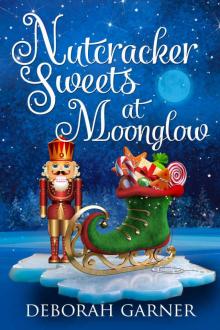 Nutcracker Sweets at Moonglow
Nutcracker Sweets at Moonglow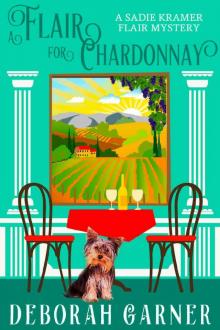 A Flair for Chardonnay
A Flair for Chardonnay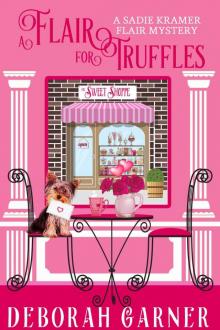 A Flair for Truffles (The Sadie Kramer Flair Mysteries Book 4)
A Flair for Truffles (The Sadie Kramer Flair Mysteries Book 4)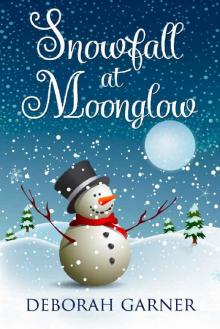 Snowfall at Moonglow
Snowfall at Moonglow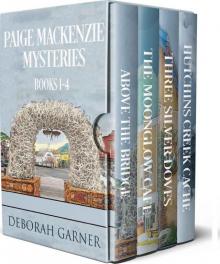 Paige MacKenzie Mysteries Box Set
Paige MacKenzie Mysteries Box Set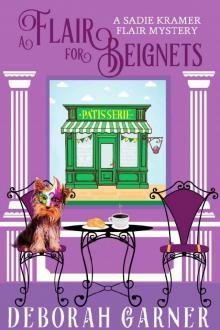 A Flair for Beignets (The Sadie Kramer Flair Mysteries Book 3)
A Flair for Beignets (The Sadie Kramer Flair Mysteries Book 3)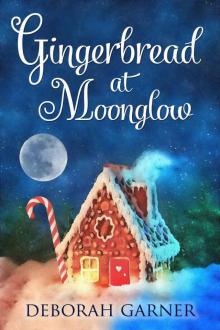 Gingerbread at Moonglow
Gingerbread at Moonglow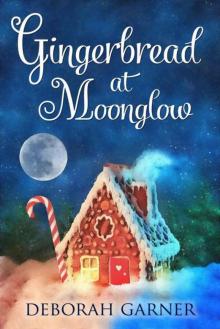 Gingerbread At Moonglow (The Moonglow Christmas Series Book 3)
Gingerbread At Moonglow (The Moonglow Christmas Series Book 3)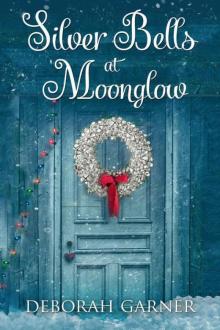 Silver Bells At Moonglow (The Moonglow Christmas Series Book 2)
Silver Bells At Moonglow (The Moonglow Christmas Series Book 2)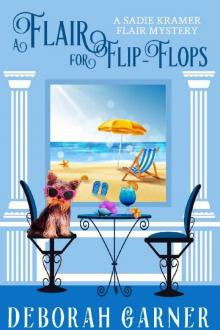 A Flair for Flip-Flops
A Flair for Flip-Flops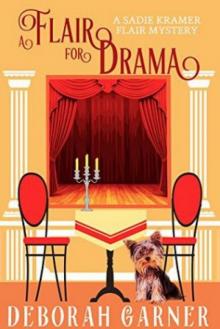 A Sadie Kramer Flair Mystery 02 - A Flair For Drama
A Sadie Kramer Flair Mystery 02 - A Flair For Drama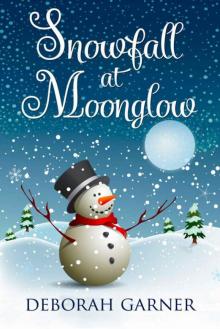 Snowfall At Moonglow (The Moonglow Christmas Series Book 5)
Snowfall At Moonglow (The Moonglow Christmas Series Book 5)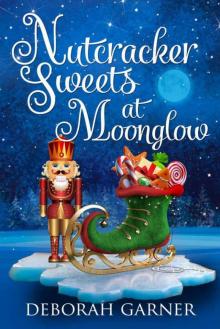 Nutcracker Sweets At Moonglow (The Moonglow Christmas Series Book 4)
Nutcracker Sweets At Moonglow (The Moonglow Christmas Series Book 4)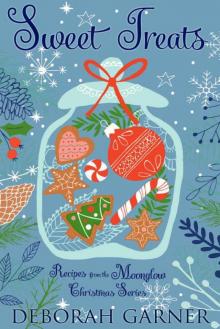 Sweet Treats: Recipes From 'The Moonglow Christmas Series'
Sweet Treats: Recipes From 'The Moonglow Christmas Series' Mistletoe At Moonglow (The Moonglow Christmas Series Book 1)
Mistletoe At Moonglow (The Moonglow Christmas Series Book 1) A Flair For Flip-Flops (The Sadie Kramer Flair Mysteries Book 5)
A Flair For Flip-Flops (The Sadie Kramer Flair Mysteries Book 5) Above the Bridge
Above the Bridge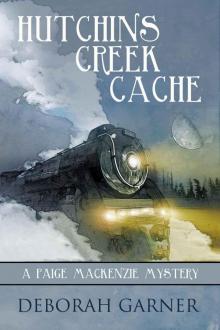 Hutchins Creek Cache
Hutchins Creek Cache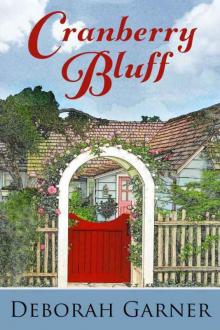 Cranberry Bluff
Cranberry Bluff